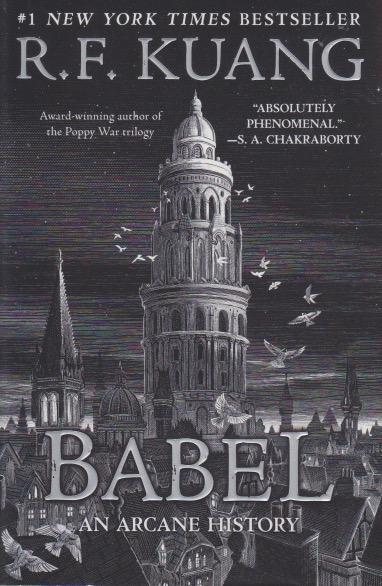
In these days when daring to think feels dangerous, R. F. Kuang’s Babel: An Arcane History feels dangerous to read. Good literature is like that, even if it’s uncomfortable to read as a “white” man. A fantasy largely set in Oxford, it’s based on the premise that languages, when placed next to one another, engraved in silver, have enormous power. The power to run an empire. This is a post-colonial story, and I took comfort in the working class support, for their own reasons, of exposing the very dangerous world of capitalism. With its “human capital” as we’re now being called by businessmen. But I digress. Four students, three from abroad, are brought to Babel, a tower in Oxford that houses the Royal Institute of Translation. Their use of their native tongues helps build immense power in this Oxford tower. Power that fuels Britain’s imperial goals. But all is not well in academic paradise.
Slowly three of the four scholars come to realize that their home countries are being exploited for purposes of yet further exploitation. The wealth always flows back to England, and even the small emoluments it offers to those other nations cannot negate the fact that the end goal is British superiority. The protagonist is Chinese, taken from poverty to live in academic luxury, in exchange for what was his birthright—his linguistic ability. It doesn’t end well. This is not a happy novel. But it does highlight something we seldom consider; our language ability is truly an amazing thing. We try to convey a fraction of what’s going on in our heads to another person, and that person has some ability to understand it. And languages are ways of thinking. I used to tell my students that all the time. It’s more than just words.
This is also a fairly long book. As with most fairly long books, you’re left feeling it once the story concludes. Even though language allows us to communicate, it’s sometimes uncomfortable to hear what someone else is thinking. We don’t have to be woke to realize that Black, or Asian, or indigenous experience is quite different from what we call “white.” And such voices deserve to be heard. We live in a time when white men don’t like to be told that they’ve participated in oppressive behaviors. Probably most of them (for I believe people are generally good) are not intentionally evil, but they participate in a system which can be. And often unthinkingly so. Thus these days thinking feels dangerous. And this book will make you do so, nevertheless.
